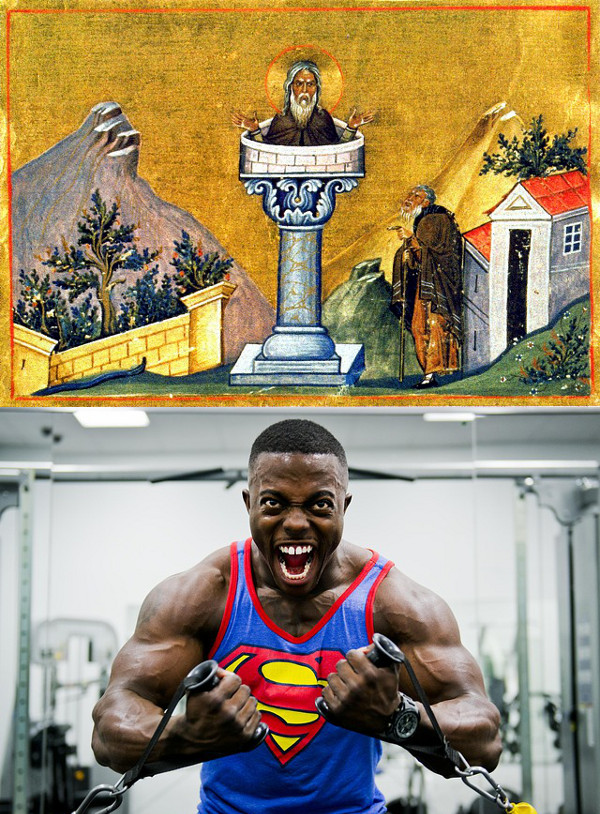When I was in nursery school the nuns taught us to make some small sacrifices, which were labeled fioretti (literally: small flowers. This word expresses the idea of a small offer to the Virgin Mary). Good deeds, of course, but typically focusing on the effort itself, not on obtaining tangible results.
I have a vivid memory of the small poster on the wall where we glued our tiny paper flowers, regular shapes comprised of a few red petals and a yellow circle in the middle. One flower for each fioretto (sacrifice) made: we felt rewarded for being good. And proud of the accomplishment! I don’t remember instead the specific subject of my small achievements: maybe, being a glutton, I managed to skip dessert a couple of times?
To think of it, the poster was hung high… only the teacher could glue the flowers to the poster, ostensibly to avoid cheaters. Because, let’s face it, human nature is always the same, even when you’re 4.
Did this routine make sense? Or maybe such upbringing ruined our lives, making people feel repressed and full of complexes?
We know how to train our bodies, we neglect our minds. Lemme explain.

The stylite: a Christian extreme sport. Living permanently on top of a column. This too is a form of training, even if it’s not involving your muscles.
Strength through Order.
Nature isn’t intrinsically good. The Universe is entropy, disorder. Beautiful things decay, features disappear; everything levels off. Cities are razed to the ground; a black stallion running wild through the prairie, his perfect coat glistening in the sun, tomorrow will be flies and rotten flesh and stench.
Life is an exception, an island of order; but this costly order is limited to what is strictly necessary to continue to exist. All living beings are tainted by a sort of gravitational pull towards imperfection and chaos; at the very least you can agree their most essential trait is being mortal.
Physiology is stingy: nothing is developed that isn’t needed. An immune system that isn’t put in contact with enough pathogens may lose focus and attack the organism itself; in any case, through inaction it becomes unprepared to counter a serious infection. Unused muscles atrophy; an individual that has no function within the group or society gets old faster and dies.
Every time you go out for a walk or to the gym, even if unaware of the concept, you are playing a part in this everlasting battle of life against entropy: you’re fighting the decay of your body.
As my friend Pompeo told me recently, it’s a losing battle anyway: look at those gym devotees in their 30s, pushing their carcasses through strenuous activities like spinning, BodyPump or suspension training. Eventually the weakest link in their bodies fails, be it a tendon, a cartilage… The new battleground then: drugs, exams, physiotherapy, post-therapy training…
We need to get realistic about our limitations.
But the most authentic human endeavor consists in striving for perfection, never resigning to Nature.
What’s true for the body is even truer for the mind. While training to improve your intellect or your virtue, you run the risk of pushing the envelope to the breaking point. But the Superheroes of the Soul, those are real.
Improve what matters (soul/body)
The mind is way more crucial than the body for our uplifting, to reach a more advanced level of order. Keep in mind, though, that it is still tainted by Original Sin, as everything that is part of our universe is: without constant reinforcement it degenerates.
An old man deciding to stay in bed for a few days will never walk again; many Auschwitz survivors died a few days after their liberation because their digestive system couldn’t cope with normal quantities of food. The same goes for your brain: growing older while keeping it busy with multiple interests, books and crosswords will prove highly beneficial, while instead an elderly person staring at the wall the entire day, aimlessly brooding about past life, will quickly develop a mental confusion and inability to separate reality from fantasy.
Above all: someone who doesn’t push himself to make sacrifices, who doesn’t set moral standards, who isn’t interested in making some effort to keep his primitive brain at bay, will inevitably fall lower and lower. He’ll equate self-control to pointless rigidity, to a torment even; he’ll struggle to keep balance through life’s difficulties.
Abolishing self-denial, keeping them shielded from difficult choices, you can’t be surprised if your children grow up immature, flirting around, proud of their falling prey of passions, unwilling to take any responsibility.
Side note: what kind of father, when his 15 years old son is going out for the evening, addresses him with “Take this condom. I know you couldn’t control your urges anyway. So have fun, but use precautions!”?
In this life you don’t just fight with the inevitable hardships that we are all bound to face, sooner or later. In absence of significant restraints, we make up new ones. Hence, once religious conformism became outdated, people began agonizing over being overweight, feeling guilty for their skipping gym or eating that damn extra cake slice.
Would you call this a progress? Dismissing the whole idea of a noble pursuit of virtue, enriching the soul (although most people took it superficially), to obsess instead about other people’s gaze, about the need to appear young and fit, to the point of developing mental disorders (e.g. anorexia and bulimia, two modern phenomena stemming from an unhealthy relationship with one’s body)…
A nursery school run by nuns in the ’70s taught me that a few arbitrary sacrifices make you stronger, capable of self-control and of setting life priorities without defaulting to animal instincts.
Today’s nurseries and schools more often than not insist that you can decide to be a boy, a girl or something else, on a whim. Becoming vulnerable to random external influences, through emotions you can’t comprehend, without a compass, without a reason. Encouraged to become a fragile butterfly before you could appreciate the opportunity of growing stronger.
Rigidity is good
Fasting, abstaining from meat during certain prescribed times… it sounds so quaint and outdated! Who’s taking such things seriously anyway, these days?
We need to outgrow such superficial attitude. Under the pretense of emancipation lays the passive attitude of those who follow the herd.
Absolute freedom is an illusion. A child craves guidance from his parents, which includes rules and punishments. He wants to build a relationship based on a dynamic tension, earning his freedom, concession after concession. Maturing is about striking a healthy balance between duties and desires. Otherwise, letting teenagers absolutely free means making them feel abandoned, unfocused and helpless.
What life lessons could you possibly claim to have learned, if you don’t feel the urge to pass down to them some essential values and truths, for their own good?
To quote Costanza Miriano, from her best-seller book Marry Him and Be Submissive:
Since education is the pathway towards maturity, it’s crucial to teach the importance of deferring gratifications; of doing so of one’s own volition; of refocusing the principle of pleasure on a greater good.
We really miss a father figure, someone who utters the most consequential Noes.
Besides, the very same father-son dynamic is also essential to our relationship with God. Who’s demanding we strive to do more.
The strength of the Church lies in the testimonies that come through hard facts: the blood of martyrs.
A saint, faced with a quiet and peaceful situation at home, sensing he’d run the risk of becoming weak and lazy, used to choose a Mission on a faraway land.
Looking for action, troubles, challenges, bravely. That’s the spirit that fortifies men, the spirit that built a civilization.
But what could you possibly do to come prepared for the call to a dangerous mission? And what about all those who weren’t going to face any missionary work or persecutions in their entire lives?
Hence the rationale for training your soul. It’s not by chance that Saint Ignatius of Loyola had the stroke of genius to introduce the Spiritual Exercises.
We hunger for superheroes
A monk’s life has always been characterized by strict rules and schedules, little food, zero luxuries; work and prayer.
Think of those who purposefully torment themselves, wearing a cilice or through some other corporal mortification: aren’t they analogous to bodybuilders after all? (Soulbuilders?)
The strength of those who can subdue and control -their- matter, proving that we’re definitely not guided by our urges; attributing a relative value to personal needs, setting an example for others…
Are you surprised that many in the clergy were historically able to stand up to brigands and armies? Medieval Europe was built from the monasteries, based on the stubbornness of those monks that after every barbarian marauders’ raid went on patiently burying their brethren and rebuilding the place, heedless of their own life, instead of fleeing.
It’s not by coincidence that in today’s vocation crisis we are also witnessing a relaxing of rules and dwindling efforts to enforce those still extant.
I heard someone once recollect what happened in a monastery losing cohesion: the turning point was when they gave up waking up at 4.30 for the office of the Lauds followed by mass and breakfast, preferring to stay up after midnight to watch a late night talk show…
It’s not by coincidence that the only congregations that are growing in numbers are the most traditional (and strictest!) ones: those that are demanding from a novice to commit himself to do something unique with their life, a small but significant feat.
Consider also celibacy. You can’t live without the company of a wife, you’d feel too lonely, and yet you want to be a priest? Imagine then how could you bravely face the Landgrave of Hesse, Comrade Mao or a tribe of headhunters in the heart of the Amazon. What are you gonna do, make life and death decisions while carrying wifey ?
Prayer isn’t just spiritual training, but it would be really important even if it were for this reason alone.
Why can’t we find an atheist equivalent of saints out there?
Easy. If there’s nothing outside of this life, entropy will always win: there’s no point in fighting to achieve a higher goal… Higher according to which measure or logic?
Order is an illusion. There’s no motivation, let alone authority, that could drive you to heroic actions. Your very best could be represented by ambition or fortune bringing about a resounding victory or an honorable defeat. But that’s not properly heroism: a saint is only a Christian figure.
A saint knows that our desperate push to escape chaos and decay could only find its ultimate meaning from something laying outside this reality. That’s why the holy man is able to prove us what an authentically free man can accomplish, unencumbered by the trivial burdens of human existence.
Not just through big undertakings in the world, like establishing new congregations or building hospitals. More than anywhere else, through their being able to renounce the world, to become prayer cannons.
Ascetics: while writing this piece I discovered that this word (describing such men) comes from the Greek askesis, meaning exercise, training of an athlete.
Behold the stylite: an ostentatious saint, typically Eastern, someone who lived on top of a column for years, like Saint Simeon or Saint Daniel (pictured in the icon opening this article), “unperturbed while facing the brunt of cold, heat or winds”.
Think about all those hermits who abandoned the comforts of civilization, or those friars and nuns that ch(o)ose to spend their life in a cell, walled up, praying and meditating.
Among other things, those ascetics developed such a depth and clarity of thought to be admired and sought after as great sages and life mentors: many kings and emperors asked them for advice and accepted to be rebuked with good grace.
If you don’t get how a frail little holy man, secluded in his tiny cell to pray, could love and know human beings more than anyone else, you don’t understand life.
The average westerner nowadays expresses contempt and pity for such people, as if their mission was the expression of some psychopathology. Many are eager to admit and even praise the wisdom of a monk but only if he’s a Buddhist monk, possibly to be found on top of a Tibetan mountain.
A curious form of selective blindness indeed.

Guess what. Old wives’ religious practices are good for you.
Back to Earth. To us puny sinners. Even if we’re not professional athletes, we should try and keep ourselves in good shape. Spiritually.
If we put it this way, the salus animarum, the sanity of the souls, isn’t just about eternal salvation, but also staying spiritually healthy, which is how you can walk on that path.
Prayer. Praying every day. Who dares teach this simple hygienic principle nowadays? We’d need to be very persistent to instill the idea in the younger generation, instead we are ashamed of speaking up in a world that conducts itself as if God wasn’t real, nor relevant.
Going to mass. Don’t you feel ashamed when you fail to go to a gym lesson because you’re lazy? There you go: same concept. A mass is meant to be assumed in regular doses.
Now, since your soul is more important than your body, and mass is an intimate encounter with Someone who loves you, that insignificant sacrifice represented by “wasting” an entire hour a week can’t be compared to the gift of the Eucharist you receive.
Last but not least, a few “unnecessary” sacrifices are exceptionally fruitful, to teach us about self-control. This of course includes fasting on Ash Wednesday and Good Friday, abstaining from meat (or some other good deed) on other Fridays.
A stupid objection: “it serves no purpose!”
People from all walks of life apparently know better: what good could possibly come from endlessly reciting the same formulas and prayers, or worse, wasting away a life full of possibilities to indulge in self-mortification?
Think of those loons who adopted masochistic practices like flogging themselves! Luckily, we’re not in the Middle Ages anymore!
Look it this way. According to this pseudo-utilitarian logic, most of our lives don’t make sense either. If you’re jogging you’re a fool, since you don’t go anywhere in particular. You move your body, run around in circles and return home without reaching a destination!
What about weight lifting! After all that pain and sweat moving around those lead thingies, eventually you put them in the same spot you found them! Worse, the following day those same people get back to the same place and repeat all the same movements, again and again!
Believe my words, the words of a prayer white belt; I know very little on the subject, I’m at a basic level, prone to distractions. If you don’t try, you don’t know what you’re missing. Repetitive my foot.
Elasticity is good
We must add that this whole abstinence and fasting sacrifice (as prescribed by the Catholic Church) isn’t really that hard: with all the possible adjustments and exceptions based on the personal judgement of the individual practicing it, based on age, health, job activity and other needs…
It became more of an invitation to do something, even unrelated to meat consumption, like a small sacrifice or some extra prayers on a Friday, plus eating a minimal amount of food twice a year. If you feel like doing more, good for you.
Now, consider another example.
Fasting during Ramadan is meant to be strict: in many Islamic countries it’s practically impossible to escape the judgement of others. That’s why everyone, often even non-Muslims, is forced to avoid being seen eating or drinking, for an entire month, from dawn till sunset.
Such a prescription is inevitably having very unequal effect depending on circumstances: think about when it’s in the Summer and you’re living in a tropical country.
It’s true that for instance you could be exempted for health reasons, but in practice the well-being of a person is an afterthought.
But all this rigidity doesn’t push people to become more virtuous: on the contrary, for the entire month, from sunset till dawn, people spend their time eating and overeating. It’s a compensation mechanism: fasting causes people to consume more food during that period. They also tend to mitigate the difficulty by sleeping during the day and staying awake in the night: this causes the entire society to become inefficient. People enjoy inactivity and that creates toxic habits and lifestyles, where productivity is stifled and help is expected to come from the benevolent hand of the state. Too bad for those who need to work and wake up early in the morning. Oh, that’s fair!
So, what’s Ramadan for?
It sounds, to speak bluntly, a tradition ideally fit to reinforce the prejudices of an atheist: that being religious and following some prescriptions means you’re irrational.
A bad publicity for the whole idea of obeying God.
Just like the annoying nature of the Jehovah’s Witnesses who ring your doorbell on Sunday mornings cause people to resent preachers: these are examples of vaccination against religiosity. A sort of inactive version of the religious virus, to help you defeat it.
On the other hand…
Elasticity isn’t good
I should refer again to an article by Nassim Nicholas Taleb: the most intolerant always prevails.
In the Islamic world the public religious customs and practices model the shape of the society. They represent a formidable glue: a source of pride and identification, also a strong disincentive for those who don’t join in. Ramadan strengthens the feeling of a mandatory yet willing submission. Being and obeying.
Even where Muslims are in the minority their demanding that their eating prescriptions be respected gives them the opportunity to gradually gain the upper hand on an apathetic majority.
On the contrary, the Catholic laissez faire, giving everyone the opportunity to live the Lent season as they see fit, lets a society distance itself from its very own traditions; even the faithful tend to ignore the prescriptions eventually. Not even giving abstinence a second thought.
We don’t want to impose. So we become irrelevant.
Since meat abstinence is more of a historical heritage, of the times when animal products were expensive, we say, it’s not really something we should be concerned about. It’s all formal anyway. But that’s how you lose a common ground, the sweet knock-on effect of a Faith that is lived and shared in practice, through everyday life.
Happy Easter!
(As customary, this article is being published very late…)
Many people enjoy the inane custom of wishing a happy Easter to anyone they come in contact with, mostly acquaintances you’re not really interested in interacting with. Well, no harm done. But I think it would be a lot more fruitful, next year, to wish a Happy Lent to your fellow brethren: finding joy in knowing you’re building something better within you, feeling others are encouraging your efforts.
The celebration of a holiday becomes way more enjoyable after you’ve completed a journey that required some struggle on your part.
This, too, is Catholic wisdom.










































